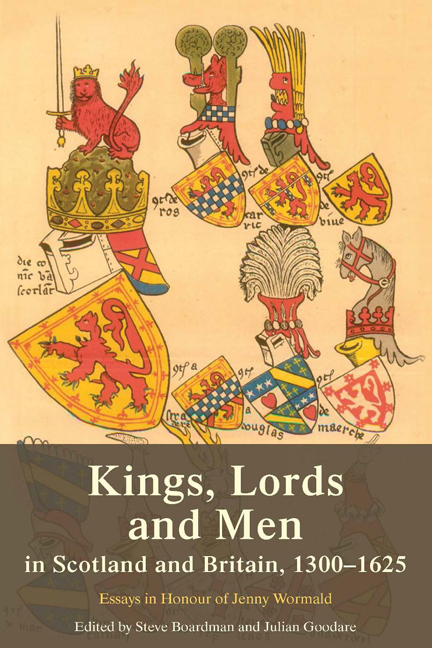Book contents
- Frontmatter
- Contents
- List of Illustrations
- Preface
- List of Abbreviations
- List of Contributors
- Introduction: Kings, Lords and Jenny Wormald
- 1 The Stewart Realm: Changing the Landscape
- Part I Lords and Men
- Part II Kings and Lords
- 9 Murder Will Out: Kingship, Kinship and Killing in Medieval Scotland
- 10 The Lanark Bond
- 11 James III: Kingship and Contested Reputation
- 12 Beyond the Declaration of Arbroath: Kingship, Counsel and Consent in Late Medieval and Early Modern Scotland
- 13 Royal Gifts and Gift-Exchange in Sixteenth-Century Anglo-Scottish Politics
- 14 The Ainslie Bond
- 15 ‘Scotland will be the Ending of all Empires’: Mr Thomas Murray and King James VI and I
- Publications of Jenny Wormald
- Index
13 - Royal Gifts and Gift-Exchange in Sixteenth-Century Anglo-Scottish Politics
from Part II - Kings and Lords
Published online by Cambridge University Press: 15 December 2017
- Frontmatter
- Contents
- List of Illustrations
- Preface
- List of Abbreviations
- List of Contributors
- Introduction: Kings, Lords and Jenny Wormald
- 1 The Stewart Realm: Changing the Landscape
- Part I Lords and Men
- Part II Kings and Lords
- 9 Murder Will Out: Kingship, Kinship and Killing in Medieval Scotland
- 10 The Lanark Bond
- 11 James III: Kingship and Contested Reputation
- 12 Beyond the Declaration of Arbroath: Kingship, Counsel and Consent in Late Medieval and Early Modern Scotland
- 13 Royal Gifts and Gift-Exchange in Sixteenth-Century Anglo-Scottish Politics
- 14 The Ainslie Bond
- 15 ‘Scotland will be the Ending of all Empires’: Mr Thomas Murray and King James VI and I
- Publications of Jenny Wormald
- Index
Summary
In the eleventh chapter of the first book of Leviathan, Thomas Hobbes considers men's social behaviour and its relationship to power. One of the most important issues is that of giving and receiving benefits. When men receive greater benefits from an equal than they can readily requite it ‘disposeth to counterfeit love’, but breeds actual hatred because benefits oblige, and obligation ‘is thraldom’. On the other hand, if requital can be made, then there is a positive affirmation of affection, and the acceptance of mutual aid and benefit. Earlier Hobbes links this explicitly to the process of gifting:
to give great gifts to a man, is to honour him; because it is buying of protection and acknowledging of power. To give little gifts is to dishonour; because it is but alms, and signifies an opinion of the need for small helps.
Gratitude, the response that must be generated by freely proffered gifts, would be his fourth law of nature, one of the key means of endeavouring peace within a commonwealth.
Hobbes was relating gift exchange to the need to move a group of men from a state of nature into a civil society. This may appear to have little to do with relations between realms, specifically here between Scotland and England in the preceding century. But Hobbes’ understanding of honour, and his insistence on the centrality of gifts and gratitude in endeavouring peace, offer a valuable starting point for the investigation of inter-state relations in the sixteenth century. Elements of a state of nature, with naked competition and the absence of constraining political structures, exacerbated by the collapse of religious consensus, certainly existed in early modern Europe. However, the development of diplomatic structures, and an increase in regular contact between rulers, provided a countervailing influence which, while it certainly did not always promote peace, offered the opportunity to evaluate the intentions of their peers. Hobbes offers a powerful reminder that the pursuit of peace, whether within or between states, might be a matter of ruthless selfinterest, but that it had to be articulated in symbolic form to persuade men to action. And there were few forms of behaviour that so effectively combined the symbol and substantive interest so effectively as gift exchange.
- Type
- Chapter
- Information
- Kings, Lords and Men in Scotland and Britain, 1300-1625Essays in Honour of Jenny Wormald, pp. 283 - 300Publisher: Edinburgh University PressPrint publication year: 2014



